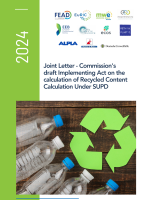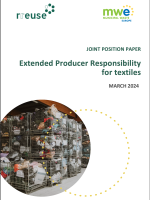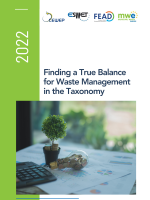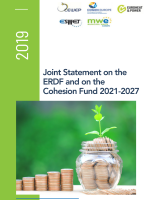Recommendations on the Council Regulation laying down a framework to accelerate the deployment of renewable energy
The above cosignatories associations welcome the objective of the Commission’s Proposal for a Council Regulation laying down a framework to accelerate the deployment of renewable energy. However, the predominant focus on power and technology specific measures proposed are not justified in light of the Council conclusions of 20-21 October. These called the European Commission to submit concrete urgent measures including the “(f) fast-tracking of the simplification of permitting procedures in order to accelerate the rollout of renewables and grids including with emergency measures on the basis of Article 122 TFEU”, but never specified these should only target renewable power.
Lengthy and complex administrative procedures have been identified as one of the key obstacles hampering the speed and number of investments in renewables. For biogas and biomethane, permitting time ranges from 2 to 8 years in the EU. The REPowerEU includes a Biomethane Action Plan to increase EU production to 35bcm by 2030 and accelerate EU’s energy independence while boosting green transition. For these reasons, for the Regulation to effectively drive the acceleration of renewable energy deployment, it should target renewable energy rather than renewable power and key renewable sources such as biomethane, recognized as key solution to reduce dependence on Russian fossil fuels and fast forward the green transition.
| EC proposal | EBA’s recommendations |
|---|---|
(6) It is necessary to introduce additional targeted measures addressed to specific technologies and types of projects which have the highest potential for quick deployment and immediate effect on the objectives of reducing the price volatility and reducing the natural gas demand without constraining overall energy demand. In addition to the acceleration of the permit-granting procedures, for solar energy equipment on artificial structures, it is appropriate to promote and accelerate the deployment of small-scale solar installations for renewables self-consumers including for collective selfconsumers, such as local energy communities, since these are the cheapest and most accessible options with least environmental or other type of impacts for a fast roll-out of new renewable installations. In addition, these projects directly support households and companies that face high energy prices and shield consumers from price volatility. Repowering of renewable energy power plants is an option for rapidly increasing renewable energy production with the least impact on the grid infrastructure and the environment, including in the case of those renewable energy production technologies, such as wind power, for which permitting procedures are typically longer. Lastly, heat pumps are a direct renewable alternative for natural gas boilers and have the potential to significantly reduce the natural gas demand during the heating season | (6) It is necessary to introduce additional targeted measures addressed to specific technologies and types of projects which have the highest potential for quick deployment and immediate effect on the objectives of reducing the price volatility and reducing the natural gas demand without constraining overall energy demand. In addition to the acceleration of the permit-granting procedures, for solar energy equipment on artificial structures, it is appropriate to promote and accelerate the deployment of small-scale solar installations for renewables self-consumers including for collective selfconsumers, such as local energy communities, since these are the cheapest and most accessible options with least environmental or other type of impacts for a fast roll-out of new renewable installations. In addition, these projects directly support households and companies that face high energy prices and shield consumers from price volatility. Repowering of renewable energy |
(7) One of the measures proposed consists of the introduction of a rebuttable presumption that renewable energy projects are of overriding public interest and serving public health and safety, in particular, for the purposes of the relevant Union environmental legislation, except where there is clear evidence that these projects have major adverse effects on the environment which cannot be mitigated or compensated for. Renewable energy plants, including heat pumps or wind energy, are crucial to fight climate change and pollution, reduce energy prices, decrease the Union’s dependence on fossil fuels and ensure the Union’s security of supply. Presuming renewable energy plants, including heat pumps, as being of overriding public interest and serving public health and safety would allow such projects to benefit, where necessary, from a simplified assessment for specific derogations foreseen, in particular, in the relevant Union environmental legislation with immediate effect. In order to address the increased urgency for action, in the light of events since May 2022, this rebuttable presumption should apply to all renewable energy projects for which balancing of legal interests takes place within the duration of the present regulation. It only applies to new permitting procedures that start during the application of the regulation. | (7) One of the measures proposed consists of the introduction of a rebuttable presumption that renewable energy projects are of overriding public interest and serving public health and safety, in particular, for the purposes of the relevant Union environmental legislation, except where there is clear evidence that these projects have major adverse effects on the environment which cannot be mitigated or compensated for. Renewable energy plants, including heat pumps, |
(13) It is estimated that onshore wind capacity of 38 GW is reaching the end of its normal operational life of 20 years between 2021 and 2025. Decommissioning these capacities instead of repowering would lead to a substantial reduction of the currently installed renewable energy capacity, further complicating the situation in the energy market. Immediate simplification and accelerated permitting for repowering are crucial for maintaining and increasing the renewable energy capacity in the Union. To this end, the proposed Regulation introduces additional measures. | (13) It is estimated that onshore wind capacity of 38 GW is reaching the end of its normal operational life of 20 years between 2021 and 2025. Decommissioning these capacities instead of repowering would lead to a substantial reduction of the currently installed renewable energy capacity, further complicating the situation in the energy market. Immediate simplification and accelerated permitting for repowering are crucial for maintaining and increasing the renewable energy capacity in the Union. Repowering can become relevant at a later stage also for other renewable technologies such as biogas plants. To this end, the proposed Regulation introduces additional measures. |
(17) ) Heat pumps are a key technology to produce renewable heating and cooling from ambient energy, including from wastewater treatment plants, and geothermal energy. They also allow the use of waste heat and cold. The rapid deployment of heat pumps which mobilises underused renewable energy sources such as ambient energy, geothermal energy and waste heat from industrial and tertiary sectors, including data centres, makes it possible to replace natural gas and other fossil fuel-based boilers with a renewable heating solution, while increasing energy efficiency. This will accelerate the reduction in the use of gas for the supply of heating, both in buildings as well as in industry. In order to accelerate the installation and use of heat pumps, it is appropriate to introduce targeted shorter permit-granting procedures for such installations, including a simplified procedure for grid connection of smaller heat pumps unless no such procedure is required by national law. Thanks to a quicker and easier installation of heat pumps, the increased use of renewables in the heating sector, which accounts for almost half of the Union’s energy consumption will contribute to security of supply and help tackling a more difficult market situation. | (17) ) Heat pumps are a key technology to produce renewable heating and cooling from ambient energy, including from wastewater treatment plants, and geothermal energy. They also allow the use of waste heat and cold. The rapid deployment of heat pumps which mobilises underused renewable energy sources such as ambient energy, geothermal energy and waste heat from industrial and tertiary sectors, including data centres, makes it possible to replace natural gas and other fossil fuel-based boilers with a renewable heating solution, while increasing energy efficiency. This will accelerate the reduction in the use of fossil gas for the supply of heating, both in buildings as well as in industry. In order to accelerate the installation and use of heat pumps, it is appropriate to introduce targeted shorter permit-granting procedures for such installations, including a simplified procedure for grid connection of smaller heat pumps unless no such procedure is required by national law. Thanks to a quicker and easier installation of heat pumps, alongside with other renewable heating solutions such as biogas and biomethane, the increased use of renewables in the heating sector, which accounts for almost half of the Union’s energy consumption will contribute to security of supply and help tackling a more difficult market situation. |
(19) The principle of energy solidarity is a general principle under Union law6 and applies to all Member States. In implementing the principle of energy solidarity, the proposed measures allow for cross-border distribution of the effects of faster deployment of renewable energy projects. They are addressed to renewable energy installations in all Member States and capture a wide scope of projects, including on existing structures, new installations of solar energy equipment of renewables self-consumers and repowering of existing installations. Given the degree of integration of Union energy markets, any increase in renewable energy deployment in a Member State should be beneficial also for other Member States in terms of security of supply and lower prices. It should help renewable electricity flow across the borders to where it is most needed and ensure that cheaply produced renewable electricity is exported to Member States where the electricity production is more expensive. In addition, the newly installed renewable energy capacities in the Member States will have an impact on the overall gas demand reduction across the Union. | (19) The principle of energy solidarity is a general principle under Union law6 and applies to all Member States. In implementing the principle of energy solidarity, the proposed measures allow for cross-border distribution of the effects of faster deployment of renewable energy projects. They are addressed to renewable energy installations in all Member States and capture a wide scope of projects, including on existing structures, new installations of solar energy equipment of renewables self-consumers and repowering of existing installations. Given the degree of integration of Union energy markets, any increase in renewable energy deployment in a Member State should be beneficial also for other Member States in terms of security of supply and lower prices. It should help renewable electricity and renewable gas flow across the borders to where it is most needed and ensure that cheaply produced renewable electricity is exported to Member States where the electricity production is more expensive. In addition, the newly installed renewable energy capacities in the Member States will have an impact on the overall gas demand reduction across the Union while the production of biomethane helps further decarbonizing the gas sector via renewable sources. |
Article 4 Repowering of renewable energy power plants
| Article 4 Repowering of renewable energy
Where the repowering of a renewable energy |
In addition: the word “electricity” should be replaced in several recitals (2), (3), (12), (14) by “energy” to convey a more comprehensive message including also renewables gases such as biogas and biomethane.
About the EBA
The European Biogas Association is the voice of biomethane in Europe and advocates for its recognition as sustainable, on demand and flexible energy sources that provide multiple knock-on socio-economic and environmental benefits. Supported by its members, EBA is committed to work with European institutions, industry, agricultural partners, NGOs and academia to develop policies which can enable the large-scale deployment of biomethane and organic fertilisers throughout Europe, supported by transparent, well established sustainability certification bodies to ensure that sustainability remains at the core of the industry. The association counts today on a well-established network of over 200 national organisations, scientific institutes, and companies from Europe and beyond.
About MWE
Municipal Waste Europe is the European umbrella association representing public responsibility for waste. Members are national public waste associations and similar national or regional associations or municipalities. MWE is committed to sustainable waste management and has an active role on promoting the waste hierarchy, resource efficiency and best practices on waste collection and treatment across the EU. Municipal Waste Europe also advocates waste management as an indispensable service of public interest.
About GD4S
GD4S is the European association which represents the leading natural gas distributors 8 member states – France, Greece, Italy, Ireland, the Netherlands, Spain, Portugal, Romania. Together, we represent 35 million customers in Europe (more than 1/3 of the European market). Gas distributors are responsible for operating the gas distribution network, ensuring its maintenance, and its development. We are responsible for safely distributing natural and renewable gas to consumers.
About Eurogas
Eurogas is an association of 68 companies involved in the natural, renewable and low carbon gases value chains. Our members cover gas wholesale, retail, distribution and transport along with companies manufacturing equipment and providing innovative solutions for services, like blending and methane emissions management. The purpose of Eurogas is to accelerate the transition to carbon neutrality through dialogue and advocacy about optimising the use of gas and gaseous fuels.




